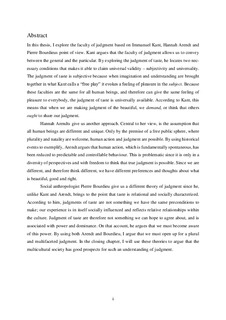En undersøkelse av dømmekraften : om forholdet mellom smak, enighet og makt
Abstract
In this thesis, I explore the faculty of judgment based on Immanuel Kant, Hannah Arendt and Pierre Bourdieus point of view. Kant argues that the faculty of judgment allows us to convey between the general and the particular. By exploring the judgment of taste, he locates two necessary conditions that makes it able to claim universal validity – subjectivity and universality. The judgment of taste is subjective because when imagination and understanding are brought together in what Kant calls a “free play” it evokes a feeling of pleasure in the subject. Because these faculties are the same for all human beings, and therefore can give the same feeling of pleasure to everybody, the judgment of taste is universally available. According to Kant, this means that when we are making judgment of the beautiful, we demand, or think that others ought to share our judgment.
Hannah Arendts give us another approach. Central to her view, is the assumption that all human beings are different and unique. Only by the premise of a free public sphere, where plurality and natality are welcome, human action and judgment are possible. By using historical events to exemplify, Arendt argues that human action, which is fundamentally spontaneous, has been reduced to predictable and controllable behaviour. This is problematic since it is only in a diversity of perspectives and with freedom to think that true judgment is possible. Since we are different, and therefore think different, we have different preferences and thoughts about what is beautiful, good and right.
Social anthropologist Pierre Bourdieu give us a different theory of judgment since he, unlike Kant and Arendt, brings to the point that taste is relational and socially characterized. According to him, judgments of taste are not something we have the same preconditions to make; our experience is in itself socially influenced and reflects relative relationships within the culture. Judgment of taste are therefore not something we can hope to agree about, and is associated with power and dominance. On that account, he argues that we must become aware of this power. By using both Arendt and Bourdieu, I argue that we must open up for a plural and multifaceted judgment. In the closing chapter, I will use these theories to argue that the multicultural society has good prospects for such an understanding of judgment.
